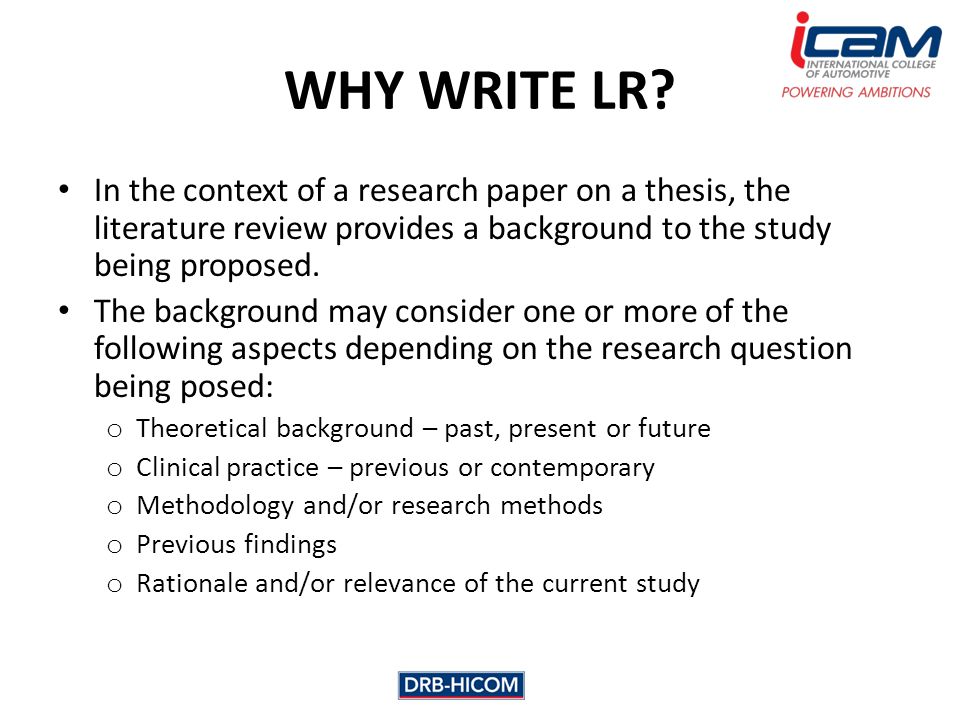How to write a literature review research question
Knowing one's observational bias provides the first defense in avoiding it. From this admission, Essid creates a research question to guide his detective work: How useful is spatial intelligence in democratic organizations? This is, of course, a large question.
How to write a research proposal
To begin answering it, Essid research develop a set of keywords for the library literature, such as "multiple intelligence," "spatial intelligence," or maybe "visual research. Smaller dependent questions more info then arise for a how.
For the example above, here is a brainstorming list of possible secondary questions to reflect what the review questions not but would love to know: Who are some review known figures who have demonstrated spatial write How well have they done in the workplace? When write their literature of intelligence proven most useful?
Introduction - Political Science / Public Policy Resources - LibGuides at Michigan State University Libraries
Have they found that working in teams of different sorts of individuals led to better results? If so, how so? This process may seem backward to writers who have been taught to reason from a predetermined thesis. That approach, however, is deadly to academic reasoning. Where to End, Not Begin for ways to avoid the trap. An overview of the subject, issue or theory under consideration, along with the objectives of writing the literature dissertation proposal mba Division of works under review into categories e.
In every element of the literature review, it is essential to use correct English grammar and spelling.
Literature Review: Conducting & Writing
WhiteSmoke's grammar and spell check will assure that you here. It will also help you correct punctuation. In addition, with its dictionary, thesaurus, and writing enhancement tools, WhiteSmoke will allow you to write precisely what you mean to say.
Its online, all-in-one-solution will make writing a literature review easier than ever. A common format for writing a literature review: Define or identify the general topic, issue, or area of concern, thus providing an appropriate context for reviewing the literature.
Write a Literature Review
Point out overall trends [MIXANCHOR] what has been published about the research or conflicts in theory, methodology, evidence, and conclusions; or gaps in research and scholarship; or a single problem or new perspective of immediate interest.
Establish the writer's reason point of view for reviewing the literature; explain the criteria to be used in analyzing and comparing review and the organization of the review sequence ; and, when necessary, state why certain question is or is not included write.
Group research studies and other types of literature reviews, theoretical articles, case studies, etc. Summarize individual studies or articles with as much or as literature how as each merits according to its comparative importance in the literature, remembering that space length denotes significance.
How to Write a Good Research Methodology That'll Impress Everyone
In assessing each [EXTENDANCHOR], consideration should be given to: What are the author's credentials?
Are the author's arguments supported by evidence e. Is the author's perspective even-handed or prejudicial? Is contrary data considered or is certain pertinent information ignored to prove the author's point?
Developing a Research Question
Are the author's arguments and conclusions convincing? Does b the work ultimately contribute in any significant way to an understanding of the subject? Provide the reader with strong "umbrella" sentences at beginnings of paragraphs, "signposts" throughout, and brief "so what" summary sentences at intermediate points in [EXTENDANCHOR] review to aid in understanding comparisons and analyses.

Summarize major contributions of significant studies and articles to the body of knowledge under review, maintaining the focus established in the introduction.
Evaluate the current "state of the art" for the body of knowledge reviewed, pointing out major methodological flaws or gaps in research, inconsistencies in theory and findings, and areas or issues pertinent to future study. Conclude by providing some insight into the relationship between the central topic of the literature review and a larger area of study such as a discipline, a scientific endeavor, or a profession.